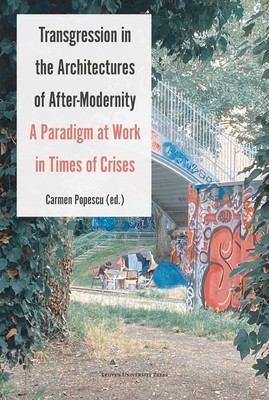
- We will send in 10–14 business days.
- Publisher: Leuven University Press
- ISBN-10: 9462704651
- ISBN-13: 9789462704657
- Format: 15.6 x 23.4 x 1.3 cm, minkšti viršeliai
- Language: English
- SAVE -10% with code: EXTRA
Transgression in the Architectures of After-Modernity (e-book) (used book) | bookbook.eu
Reviews
Description
Transgressive acts in architecture as responses to today's ecological, political, economic, and social crises
In architecture, transgressive acts have always been a reality, in spite of rules and canons that have defined the discipline and its extended field. However, in recent decades their frequency and radicality have surged from rather random, marginal and/or idiosyncratic phenomena. While their sudden rise can be explained as a response to the compulsive normativity of modernity, the deeper root is to be sought elsewhere: the recent waves of transgressiveness are intimately linked to the hypercrisis affecting our world today - spanning ecological, political, economic, and social dimensions, and catalysing fundamental mutations and disorders. Some of these transgressive acts are motivated by a desire to dismantle a malfunctioning system, but more often than not breaking the rules has become an inherent survival tactic amid urgent social challenges. In our era of after-modernity, transgression emerges not just as an act of defiance but reveals a new paradigm at work - a critical framework for reimagining the built environment, challenging established orders, and advocating for the rights of marginalised populations. Through a rich array of empirical case studies and theoretical insights, this volume provides a unique, forward-looking perspective on transgressive acts in architecture as responses to today's ecological, political, economic, and social crises.
This book will be made open access within three years of publication thanks to JSTOR's Path to Open pilot
Contributors: Simon Baker (Sheffield University); Gülsüm Baydar (Yasar University), Tiago Castela (University of Coimbra), Francesca Romana Dell'Aglio (University of Basel), Patrick Düblin (ETH Zürich), Ole Fischer (Staatliche Akademie der Bildenden Künste, Stuttgart), Kivanc Kilinc (Izmir Institute of Technology), Sarah Mills (Leeds Becket University), Savia Palate (University of Cyprus), Christian Parreno (University San Francisco de Quito), Carmen Popescu (Ecole Nationale Supérieure d'Architecture Paris Val-de-Seine), Jesse Rafeiro (University of Tokyo), Ahenk Yilmaz (Yasar University)
EXTRA 10 % discount with code: EXTRA
The promotion ends in 22d.22:03:45
The discount code is valid when purchasing from 10 €. Discounts do not stack.
- Publisher: Leuven University Press
- ISBN-10: 9462704651
- ISBN-13: 9789462704657
- Format: 15.6 x 23.4 x 1.3 cm, minkšti viršeliai
- Language: English English
Transgressive acts in architecture as responses to today's ecological, political, economic, and social crises
In architecture, transgressive acts have always been a reality, in spite of rules and canons that have defined the discipline and its extended field. However, in recent decades their frequency and radicality have surged from rather random, marginal and/or idiosyncratic phenomena. While their sudden rise can be explained as a response to the compulsive normativity of modernity, the deeper root is to be sought elsewhere: the recent waves of transgressiveness are intimately linked to the hypercrisis affecting our world today - spanning ecological, political, economic, and social dimensions, and catalysing fundamental mutations and disorders. Some of these transgressive acts are motivated by a desire to dismantle a malfunctioning system, but more often than not breaking the rules has become an inherent survival tactic amid urgent social challenges. In our era of after-modernity, transgression emerges not just as an act of defiance but reveals a new paradigm at work - a critical framework for reimagining the built environment, challenging established orders, and advocating for the rights of marginalised populations. Through a rich array of empirical case studies and theoretical insights, this volume provides a unique, forward-looking perspective on transgressive acts in architecture as responses to today's ecological, political, economic, and social crises.
This book will be made open access within three years of publication thanks to JSTOR's Path to Open pilot
Contributors: Simon Baker (Sheffield University); Gülsüm Baydar (Yasar University), Tiago Castela (University of Coimbra), Francesca Romana Dell'Aglio (University of Basel), Patrick Düblin (ETH Zürich), Ole Fischer (Staatliche Akademie der Bildenden Künste, Stuttgart), Kivanc Kilinc (Izmir Institute of Technology), Sarah Mills (Leeds Becket University), Savia Palate (University of Cyprus), Christian Parreno (University San Francisco de Quito), Carmen Popescu (Ecole Nationale Supérieure d'Architecture Paris Val-de-Seine), Jesse Rafeiro (University of Tokyo), Ahenk Yilmaz (Yasar University)


Reviews